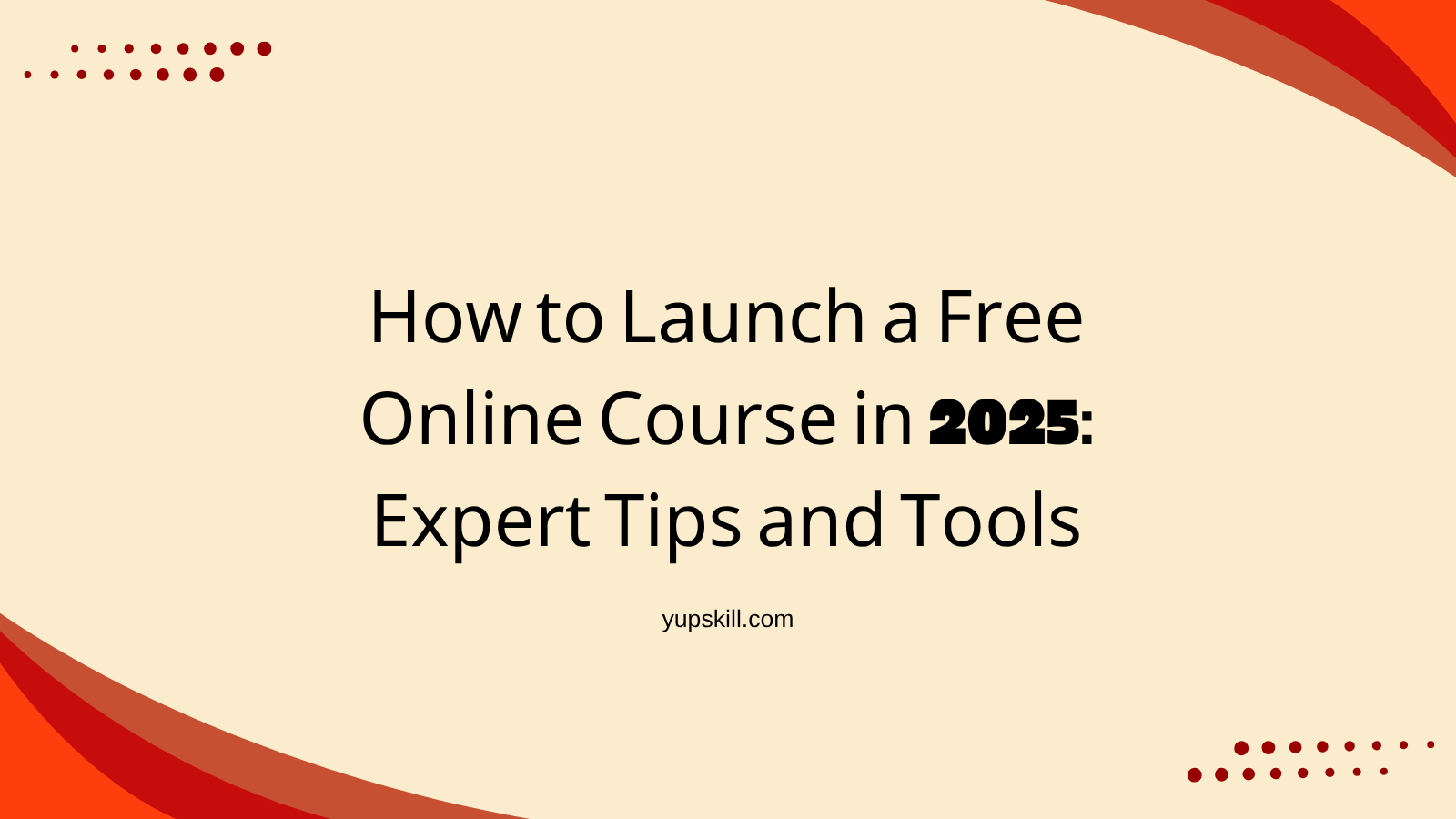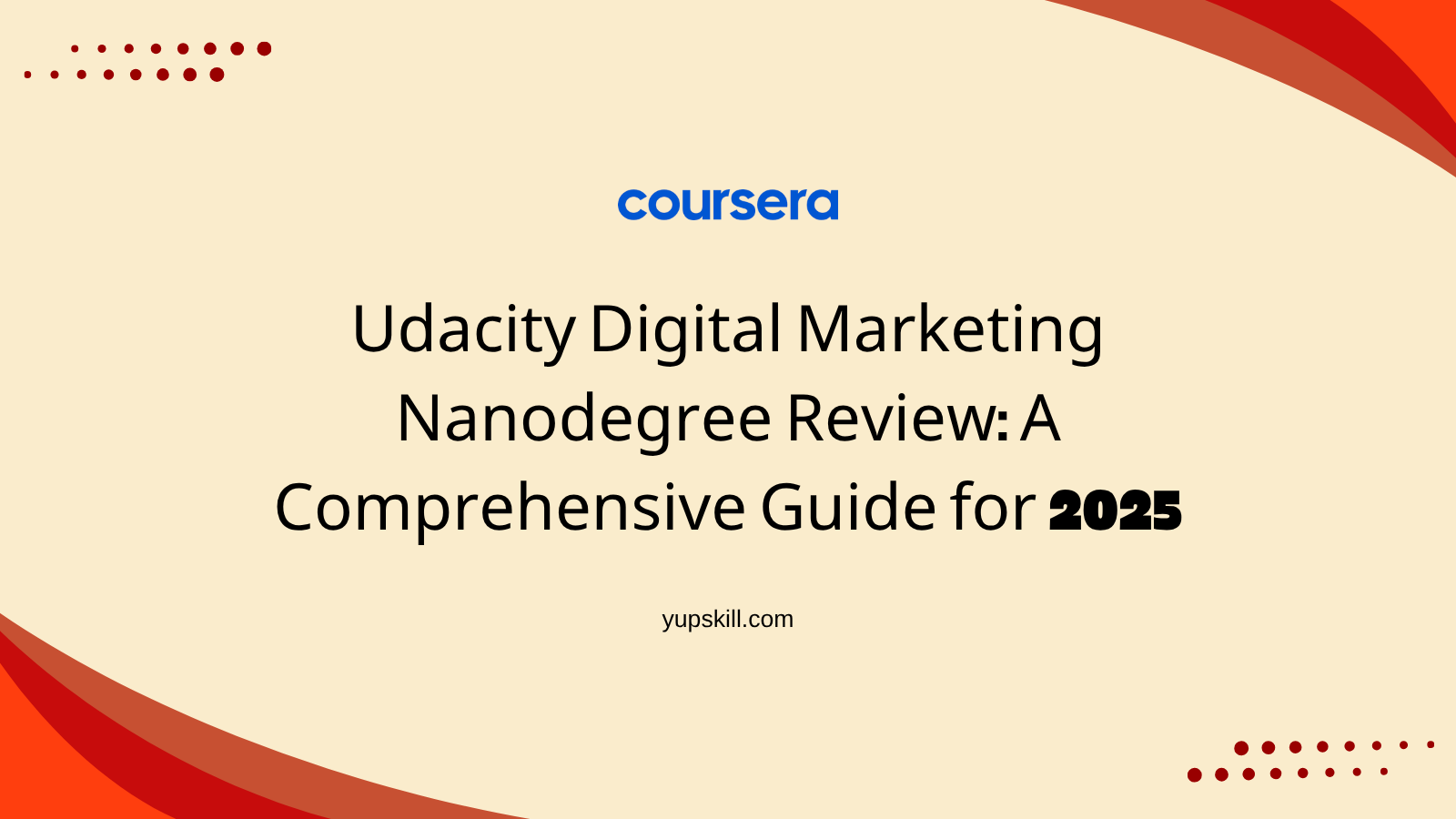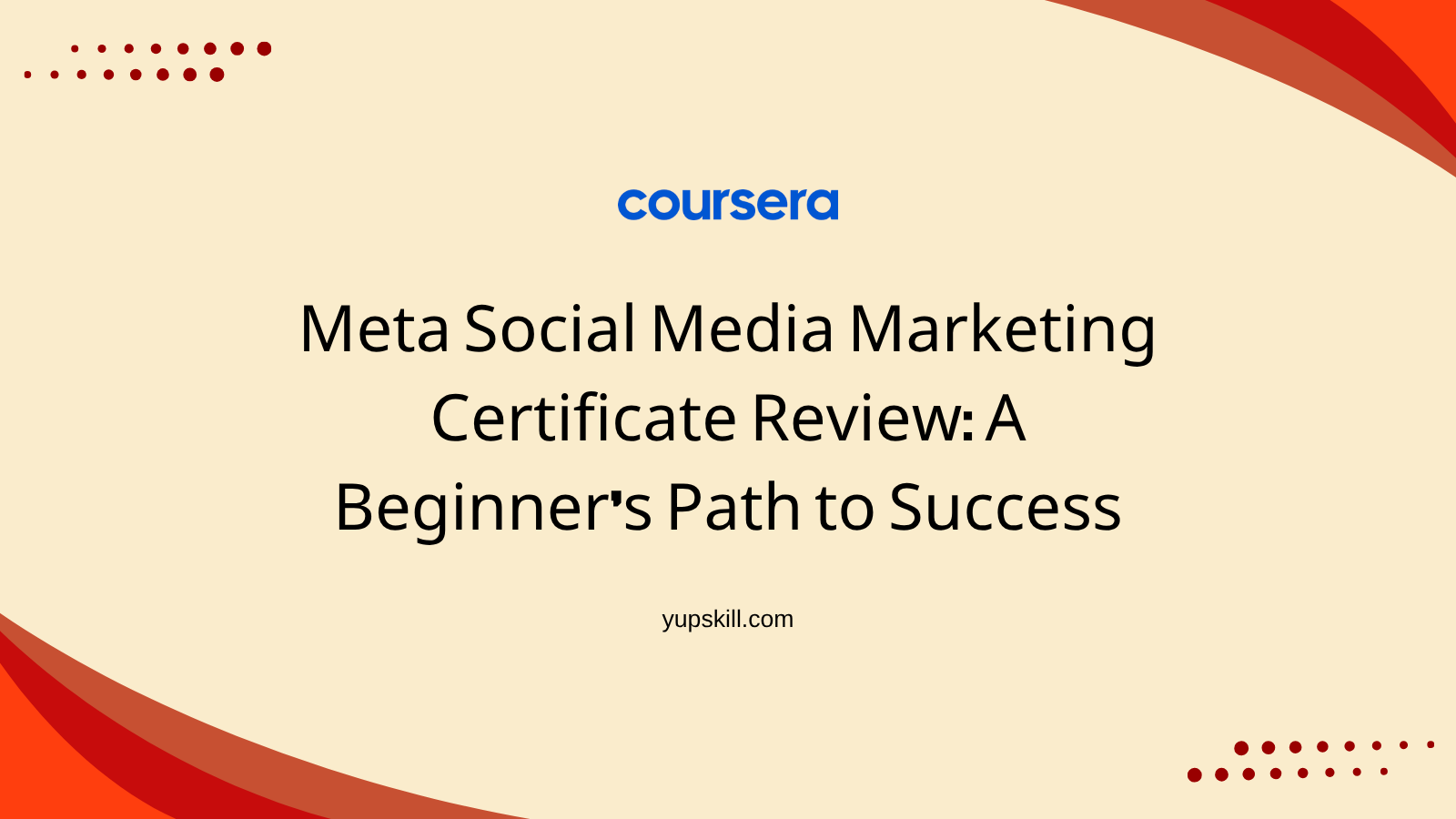In recent years, the online learning landscape has grown exponentially, with platforms offering a wide array of courses designed to help individuals learn new skills, enhance their knowledge, or even change careers.
Among the myriad of platforms available, DataCamp and edX stand out as two of the most popular choices for learners interested in acquiring technical skills, particularly in the fields of data science, technology, and analytics. However, despite both platforms offering online education, they are quite different in terms of their target audiences, course offerings, teaching styles, and overall user experiences.
This comparison will delve into the strengths and weaknesses of each platform, providing you with a clear understanding of which platform might be more suited to your learning preferences and goals.
Overview: What is DataCamp?
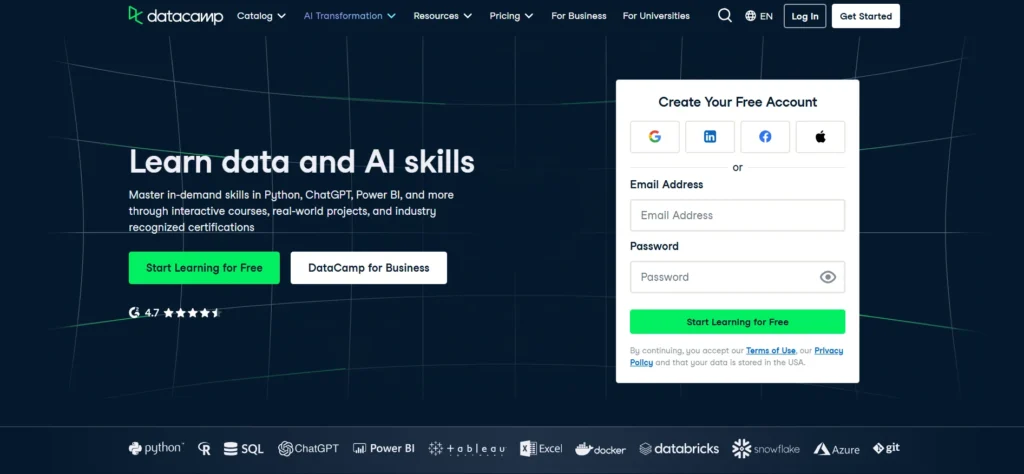
DataCamp is an online learning platform that specializes in offering interactive, hands-on courses in data science, programming, machine learning, and analytics. Founded in 2013, DataCamp has rapidly grown into one of the most popular platforms for learners looking to build their skills in Python, R, SQL, machine learning, and artificial intelligence.
The core focus of DataCamp is to provide practical, skills-based learning. The platform offers over 500 courses and a variety of learning paths designed to cater to different job roles such as Data Scientist, Data Analyst, and Machine Learning Engineer. One of the key features of DataCamp is the highly interactive nature of its courses. It emphasizes learning by doing with coding exercises, quizzes, and projects integrated into its lessons.
Key Features of DataCamp:
- Interactive Learning: Learners work directly within a coding environment in their browser, receiving instant feedback.
- Structured Learning Paths: DataCamp offers Skill Tracks and Career Tracks to help learners focus on specific skills or job roles.
- Gamification: The platform uses gamification features like badges and XP (experience points) to make learning more engaging.
- Beginner-Friendly: Courses are designed to be accessible to beginners, making it a great option for those starting in data science or programming.
DataCamp is designed for learners who prefer hands-on, practical learning over theoretical or lecture-based learning.
Overview: What is edX?
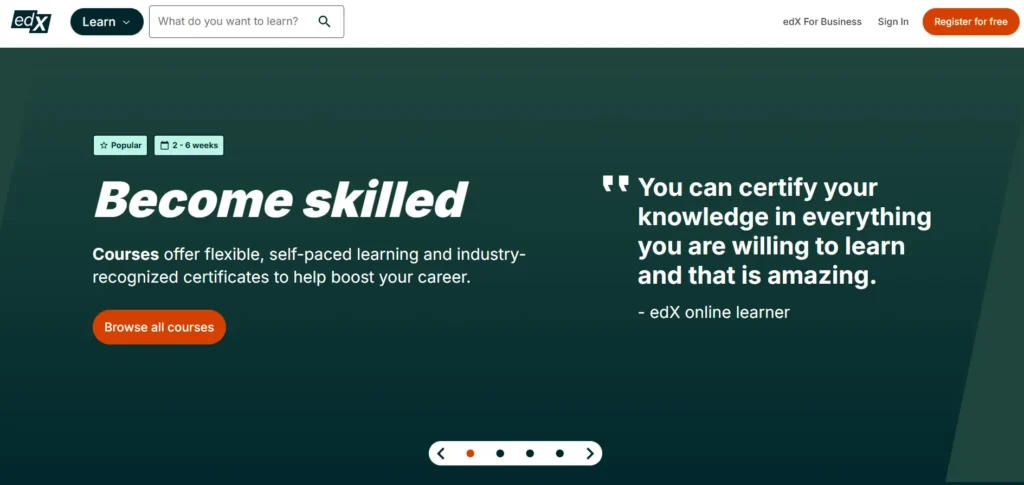
edX, on the other hand, is a much broader platform, offering a range of courses from university-led programs across various disciplines. Founded by Harvard University and MIT in 2012, edX serves as a hub for online education, providing high-quality courses, certifications, and even degree programs from top universities and institutions around the world.
While edX offers a wide range of subjects, its offerings in data science, computer science, and business are particularly strong. edX stands out for its academic rigor and is often used by professionals and students looking for formal qualifications like certificates, professional diplomas, or even full online degrees.
Key Features of edX:
- University-Level Education: edX offers courses developed by top universities like Harvard, MIT, Berkeley, and Microsoft.
- Flexible Learning Options: Learners can audit courses for free or pay for verified certificates.
- In-Depth Courses: edX provides comprehensive courses that typically combine video lectures, quizzes, assignments, and peer discussions.
- Accredited Certificates: Some courses offer professional certificates or MicroMasters programs, which are valuable for career advancement.
- Degree Programs: edX is one of the few platforms that offer full online degrees in partnership with accredited institutions.
edX is ideal for learners who are looking for more academic, formal learning and prefer to earn credentials that carry weight in the professional and academic world.
Course Offerings: A Detailed Comparison
When it comes to course offerings, DataCamp and edX are very different in both content and approach.
DataCamp’s Course Offerings
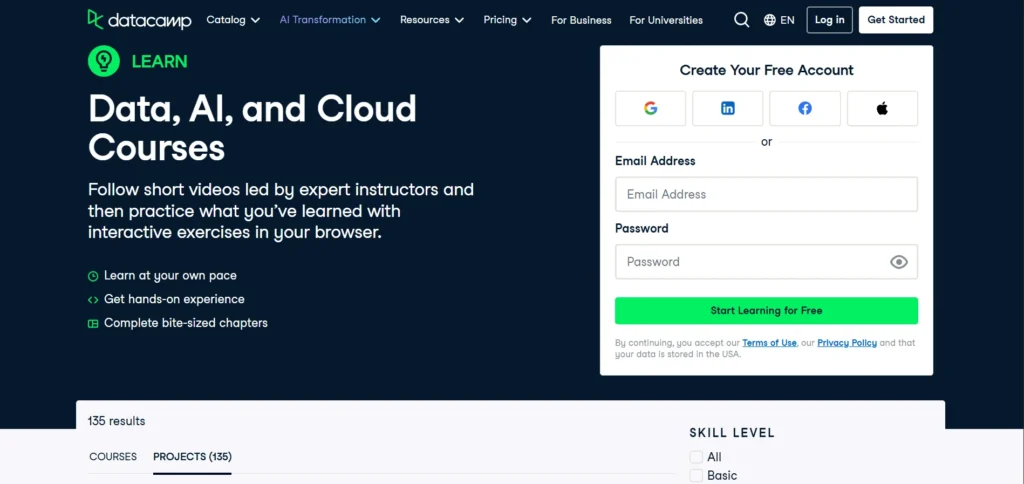
DataCamp specializes in courses related to data science and programming. It focuses on helping learners build skills that are directly applicable to the workplace. The courses on DataCamp are designed to provide learners with practical skills that can be used in real-world data analysis tasks.
- Programming Languages: DataCamp provides extensive courses in Python, R, SQL, and other data science-related programming languages.
- Data Science Topics: Courses in data manipulation, data visualization, machine learning, deep learning, and big data are some of the most popular topics.
- Hands-On Projects: Every course on DataCamp has interactive exercises where learners are asked to write and execute code directly in their browser, providing instant feedback and helping to solidify learning.
- Specialization Tracks: DataCamp offers Skill Tracks (focused on individual skills like data visualization, machine learning, etc.) and Career Tracks (designed to guide learners through a series of courses that are aimed at preparing them for specific roles such as Data Scientist or Data Analyst).
For learners specifically interested in gaining practical data science skills with a hands-on, interactive approach, DataCamp’s course offerings are unparalleled. However, if you’re looking for a broader educational experience or a deep dive into subjects beyond data science, DataCamp may not be the best option.
edX’s Course Offerings
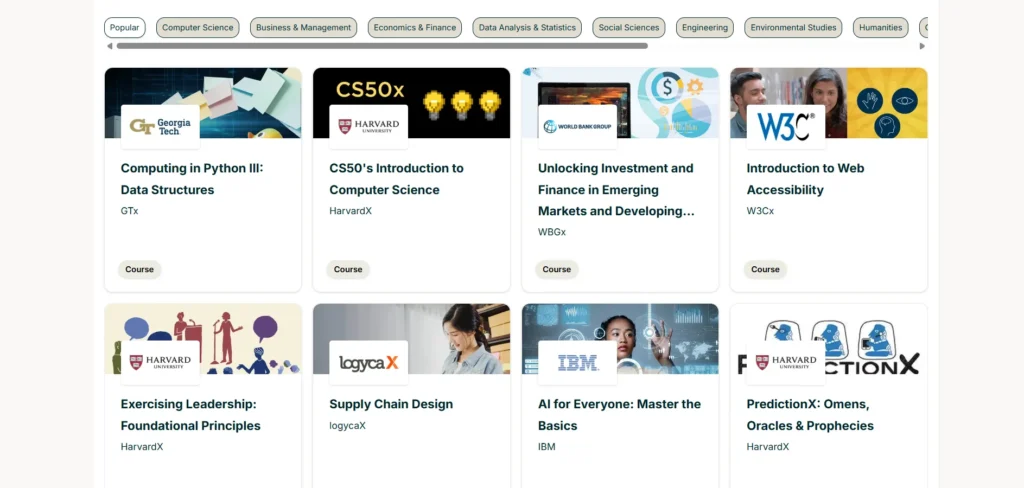
edX, in contrast, offers a much broader range of subjects, catering to a wider variety of learners. edX’s courses range from data science and computer programming to humanities, history, and social sciences.
- Data Science and Technology: edX offers a variety of data science courses, many of which are created by prestigious institutions like Harvard and MIT. These courses often have a more theoretical focus compared to DataCamp’s hands-on approach.
- University-Level Courses: edX provides graduate-level courses in data science, machine learning, and artificial intelligence, many of which are aimed at professionals who already have a foundational understanding of the field.
- Multi-Disciplinary Learning: Apart from tech and data science, edX offers courses in fields like business, economics, literature, and law. This broadens the scope of learning and allows learners to explore other areas of interest.
- Certification Programs: edX provides various MicroMasters programs, Professional Certificates, and even full online degrees, which are ideal for learners who are serious about obtaining formal qualifications from recognized institutions.
For learners who prefer an academic approach or are looking for credentials that can carry weight in the professional world, edX is the ideal choice. While it also offers practical, hands-on courses, the platform’s strength lies in its diversity and the ability to offer accredited certificates.
Learning Experience: Hands-On vs. Academic Focus
When choosing an online learning platform, the learning experience plays a crucial role in determining how well a student can retain the information taught and apply it in real-life scenarios.
DataCamp Learning Experience
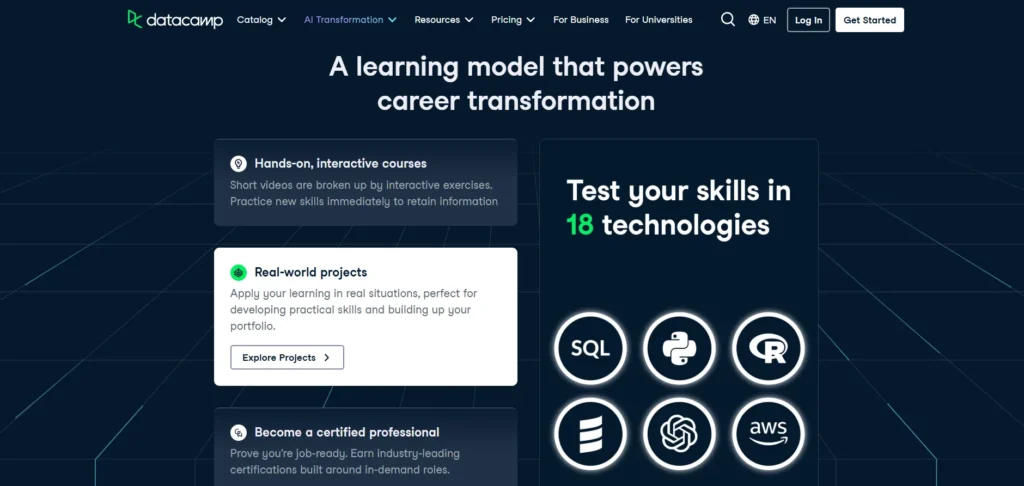
DataCamp’s learning experience is built around interactivity and engagement. As a data-driven platform, it encourages students to learn by doing. After each lesson, learners complete coding exercises directly in the browser. This hands-on approach provides immediate feedback and allows students to practice what they’ve learned in real-time.
- Gamified Learning: DataCamp includes a gamification element that makes the learning process feel more rewarding. Learners earn experience points (XP), badges, and certificates, which encourage progress and increase engagement.
- Projects and Real-World Scenarios: DataCamp offers various projects that simulate real-world problems, allowing learners to apply their coding skills to actual data challenges. This feature is particularly beneficial for learners who want to practice what they’ve learned in a simulated environment.
- Guided Learning Paths: With its Career Tracks and Skill Tracks, DataCamp gives students a structured path, helping them stay on track and advance through relevant topics and skills in a logical sequence.
edX Learning Experience
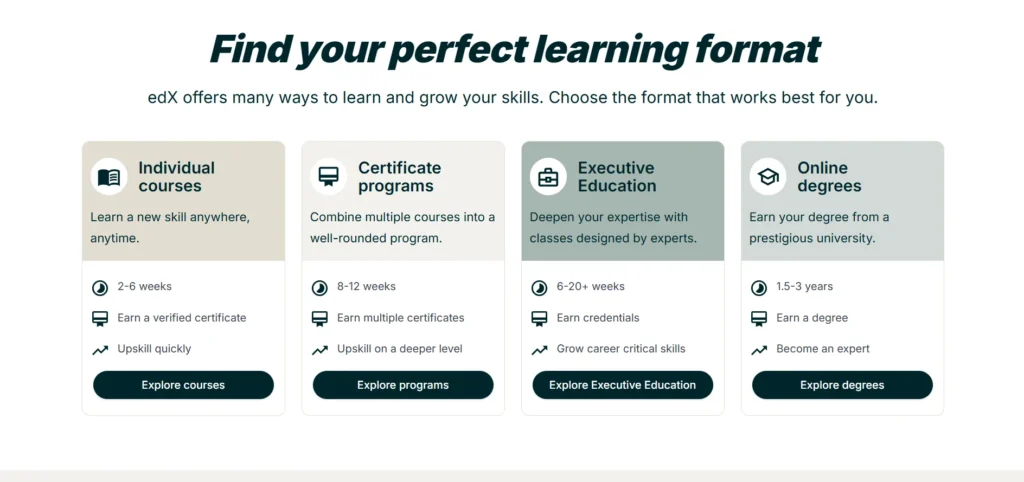
edX’s learning experience is more traditional, resembling a university-style education. Each course generally includes video lectures, reading materials, assignments, and quizzes, which together form the core structure of the course.
- Rigorous Academic Approach: Since most of the courses on edX are created by top universities, they tend to have a more academic tone. These courses require more theoretical learning, making them ideal for students who want a deep understanding of the subject matter.
- Discussion Forums: edX features discussion boards where students can engage with each other and instructors. This helps create a collaborative learning environment, although it may not be as immediate or engaging as the hands-on coding environment on DataCamp.
- In-Depth Knowledge: Many edX courses are designed to provide an in-depth understanding of the topic. If you’re looking for comprehensive knowledge and academic rigor, edX is a fantastic platform for gaining insight into the foundational theories behind the skills you’re learning.
Pricing Models: Cost Comparison
Both platforms offer flexible pricing structures, but they operate differently.
DataCamp Pricing
DataCamp operates on a subscription-based model, allowing learners to pay a monthly fee for full access to the platform’s courses. There are different subscription plans based on the level of access you need:
- Free Plan: DataCamp offers a free plan that provides access to the first chapter of each course. This is a great way to get a feel for the platform before committing.
- Premium Plan: The premium plan is the most common, priced at around $29 per month. It gives learners access to all of DataCamp’s courses, including projects, Career Tracks, and Skill Tracks. With the Premium plan, you can learn at your own pace and track your progress.
- Business Plans: DataCamp also offers customized pricing for teams and enterprises, allowing businesses to provide training for their employees.
DataCamp’s pricing is affordable and flexible, especially for learners looking to gain practical skills quickly. However, it does not provide any formal certification or degree programs, which limits its appeal for those looking for accredited qualifications.
edX Pricing
edX operates on a more variable pricing model. The platform allows learners to audit courses for free, meaning you can access course materials without having to pay for anything. However, if you want a verified certificate, you will need to pay. The cost of a verified certificate typically ranges from $50 to $300 depending on the course.
In addition to individual courses, edX offers MicroMasters programs, Professional Certificates, and even full online degrees, which come at a higher cost:
- MicroMasters and Professional Certificates: These programs usually cost between $500 and $1,500, depending on the program.
- Online Degrees: edX offers full Master’s degrees and Bachelor’s degrees in partnership with universities, and these can cost anywhere from $10,000 to $25,000.
While edX is more expensive than DataCamp, it offers more value for learners who are seeking formal credentials or online degrees. If obtaining a degree or a recognized certificate is important to you, edX is worth the investment.
Certification and Accreditation: Value of Credentials
The type of certificate or credential you earn from a course can be a crucial factor in your decision-making process.
DataCamp Certifications
After completing any course on DataCamp, learners receive a Statement of Accomplishment. This serves as proof of the skills and knowledge you gained during the course. However, these statements are not accredited by any university or recognized institution.
While these certificates are useful for demonstrating your ability to use certain tools or technologies, they hold less value than a degree or an accredited certificate.
edX Certifications
For those looking for even more substantial credentials, edX offers MicroMasters programs and Professional Certificates, which are typically accredited and can carry significant weight when applying for jobs. If you complete a Master’s degree through edX, the credential you receive is equivalent to an in-person degree and is fully accredited.
Who Should Choose DataCamp?
DataCamp is ideal for learners who want to acquire practical skills in data science and programming quickly. If you’re looking to build specific skills, like data visualization or machine learning, and prefer hands-on learning with instant feedback, DataCamp is a great choice. It’s also perfect for beginners who are just getting started in the field of data science and need a structured, user-friendly platform that emphasizes learning by doing.
Who Should Choose edX?
If you’re looking for a more academic, theoretical approach to your learning, or if you want to earn certificates or degrees that are recognized globally, edX is the better option. edX is ideal for learners who are serious about obtaining formal qualifications that can help them advance their careers or pursue further education. The platform is particularly suited for learners seeking to deepen their understanding of data science, technology, or other disciplines, and who are looking for more in-depth, university-led education.
Conclusion: DataCamp vs edX
Choosing between DataCamp and edX ultimately depends on your learning goals, preferences, and whether you’re seeking practical experience or formal credentials.
- Opt for DataCamp if you want to develop hands-on data science skills and are interested in learning through interactive coding exercises.
- Choose edX if you’re after a more comprehensive, academic approach to learning and are interested in earning accredited certificates or even degrees.
Both platforms offer significant value, but they cater to different types of learners with different needs. Consider your career objectives and personal learning style to make the best choice for your education journey.
FAQs
What is the main focus of DataCamp?
DataCamp specializes in interactive courses for data science, programming, and machine learning.
Can I access edX courses for free?
Yes, you can audit most edX courses for free, but certificates and certain features require payment.
Do DataCamp certificates hold academic value?
No, DataCamp certificates are not accredited but can showcase practical skills to employers.
Does edX offer university degrees?
Yes, edX offers online degrees in partnership with accredited universities.
Is DataCamp suitable for beginners?
Yes, DataCamp is beginner-friendly, with courses designed to teach from the ground up.

